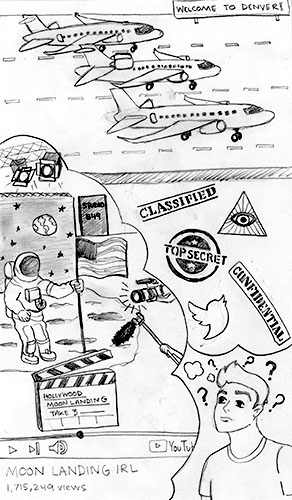Conspiracy theories gain traction through media

March 16, 2018
In 1969, Americans celebrated Neil Armstrong’s first steps on the moon; however, according to space.com, roughly seven percent of Americans believe that NASA faked the moon landing. Through different forms of media such as television, radio and the Internet, conspiracy theorists have gained a mass following, some of whom walk the halls of South.
Three years ago, a friend of senior Will Okuno mentioned a conspiracy theory regarding the Denver International Airport and a connection to the Illuminati, a supposed group of people working together to create the new world order. After hearing this, Okuno began to do research of his own.
“There are many different theories about [the Denver Airport]: that it’s the home of the Illuminati, that there are lizard people there, but the one that I do believe in is that it didn’t have to be renovated,” Okuno said. “There was no need for that to happen and that the reason they expanded was to put some secret [government installation] underground. [The location of the airport is] convenient; you’re off in the mountains, you’re far away … I’m saying that there’s something there.”
While traveling through the Denver Airport, Okuno saw murals and a statue that made him question the innocence of those involved in the renovation of the airport. After looking into the renovations a little further, Okuno says the airport itself looks as though it were designed to hide something since there was no reason to expand.
“If you look at the numbers before and after, there was no growth in how many airplanes the airport was taking in and it’s the same volume of people moving through,” Okuno said. “If they were under capacity before. . . Why would they have to then at least double the capacity of the airport?”
Sophomore Angela Schectman believes that easy access to different forms of social media has given conspiracy theories a larger platform. According to Shechtman, as more media influencers such as Shane Dawson and news outlets such as Business Insider share opinions on different theories, more light has been shed on different conspiracies.
“They’ve become a lot more popular through mainstream media, not just Reddit posts and random people,” Shechtman said. “More and more are starting to look into [the theories and] whether they believe them or not.”
In contrast to Shechtman, senior Jacob Listerman believes that as more people become interested in conspiracy theories, they come to outlandish conclusions without any evidence. According to Listerman, the media takes interest in theories that are more popular than they actually are, leading to several different versions of one story.
“News outlets are going to try and find stories to fill their time and to make revenue,” Listerman said. “So people who have these crazy ideas are going to get that shared time because people are going to tune into that.”
According to Listerman, he has trouble understanding people who believe the moon landing is fake. While he says he believes it to be okay to not take things at face value and do extra research, Listerman believes that the amount of proof against these theories proves them wrong.
“The overwhelming evidence contrary to those theories goes against everything I stand for,” Listerman said. “A sense of curiosity is good, a sense of doubt is good, and investigation is good, but when [an event] has been well documented and well established with video I can’t see how anyone can dispute those facts.”
Shechtman says that researching different conspiracy theories has become a hobby of hers. According to Shectman, she makes sure to research and find several different sources to support her theories.
“I don’t like to say things without research,” Schectman said. “I like to see the different theories and then make conclusions from there on [about] what really happened.”


